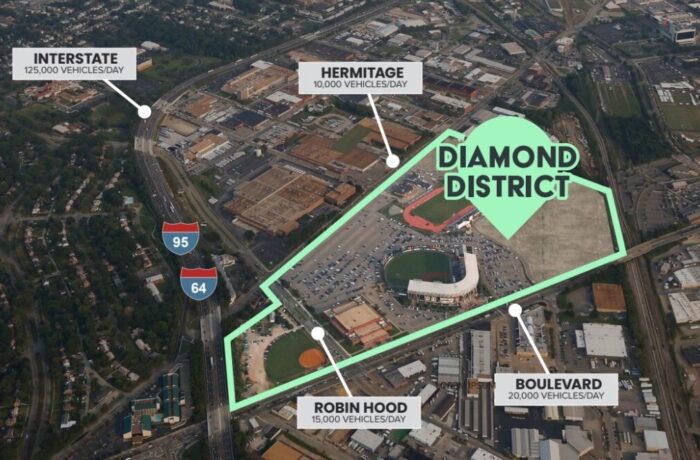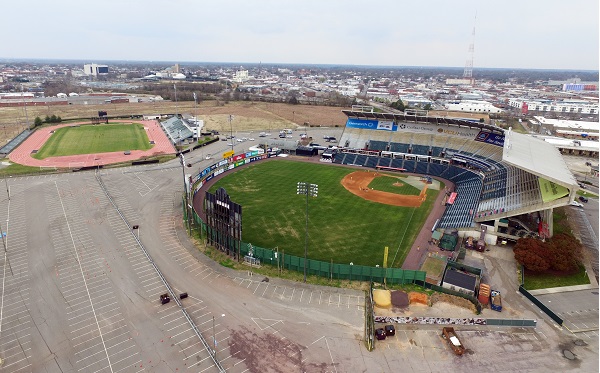
The 67-acre development site is bordered by Arthur Ashe Boulevard, Hermitage Road, the interstate and the railroad tracks. (BizSense file)
Another step has been taken in the ongoing process to tee up Richmond’s Diamond District development.
Last week, four of the six city-owned parcels that make up the bulk of the 67-acre Diamond District site were transferred to Richmond’s Economic Development Authority, which plans to subsequently sell those parcels to the project developer, RVA Diamond Partners.
The transferred parcels include the site of the planned baseball stadium that would replace The Diamond and anchor the larger development, as well as other land that would make up the project’s first phase.
Transferring the land has been needed for the EDA to petition City Council to create the project’s community development authority (CDA), which would issue nonrecourse bonds to help finance the new stadium and infrastructure improvements to support the larger development.
Leonard Sledge, the city’s economic development director, said the CDA petition is being worked up now for introduction to council at an upcoming meeting.
The authority’s Board of Directors authorized the petition filing in September. At its meeting that month, Sledge told the board that the transfers were “in process” and said afterward that his department had “prioritized other tasks related to this project and others.”
Asked Wednesday why the transfers were being completed now, Sledge was unspecific.
“It’s always been a requirement that the properties transfer to the EDA for it to proceed with the redevelopment of the site,” he said. “It’s a requirement for us to be able to proceed with the CDA formation and the issuance of bonds for the project.”
Council approved the transfer of all of the 60 acres that the city controls last May, when it also approved a development agreement with RVA Diamond Partners.
Totaling 47 acres, the parcels that transferred last week do not include the 9-acre Diamond property or the 4-acre Arthur Ashe Athletic Center property, which remain owned by the city and its parks and recreation department, respectively.
Sledge said those two properties would be transferred at a later date, adding that The Diamond would remain under city ownership while the Richmond Flying Squirrels continue to play there as the new stadium is being built. The minor-league ballclub leases The Diamond from the city.
As for the Ashe center, the Richmond City School Board has argued that it should profit from that property’s sale because it has managed the center for decades, even though it’s owned by the parks and rec department. Sledge didn’t say why that parcel hadn’t transferred, but said it would.
“Ultimately that site has always been contemplated as a part of the 67-acre redevelopment,” Sledge said.
The four properties that transferred include two parcels that are planned to make up the project’s first phase: 2907 N. Arthur Ashe Blvd., a 19-acre parcel in the Diamond District’s southwest corner that’s planned to house the new ballpark; and 2728 Hermitage Road, an adjoining 11-acre parcel along the southern edge of the site.
Also transferred were 2909 N. Arthur Ashe, a 12-acre parcel east of The Diamond that’s now a parking lot; and 3101 N. Arthur Ashe, a 5-acre parcel that includes Parker Field at the northern end of the site.
The four parcels were transferred Feb. 1 for zero dollars, city property records show. They are assessed by the city at over $43 million collectively.
According to the development agreement that was approved in May, RVA Diamond Partners would pay the city $16 million for the first-phase properties: 2907 N. Arthur Ashe Blvd. and 2728 Hermitage Road. The two parcels were assessed by the city this year at nearly $25 million combined.
The remaining 7 acres that fill out the Diamond District include VCU’s Sports Backers Stadium. That parcel is to be purchased in a separate transaction with the university, which is preparing to start development of its planned Athletic Village complex across Hermitage Road.
Sledge did not provide a time frame for the city-controlled parcels to be sold to RVA Diamond Partners, which is aiming to complete the new Diamond District stadium in time for the 2026 baseball season. In December, the EDA pitched in $1 million in city funds to help advance the new stadium’s design and development.
Expected to take at least 18 months to build, the new ballpark with a capacity of 9,000 has been projected to cost upward of $110 million, up from an earlier estimate of $90 million. The facility would contribute to a minimum investment in the first phase that’s been projected at over $627 million.
The larger Diamond District development, to include a mix of office, residential, retail and hotel uses and infrastructure improvements, is projected at $2.4 billion and targeted for completion in 15 years.
Once the EDA files its petition to council, it would then be up to council to create the Diamond District CDA and appoint its members.
CDAs are a form of tax increment financing that local governments can use to help finance a project using tax revenue generated by the development over time. They have been used locally on large-scale projects such as Short Pump Town Center in Henrico. A CDA also is being used for Henrico’s arena-anchored GreenCity project.
Such revenue – from real estate, admissions and BPOL taxes, as well as portions of meals tax and state sales tax – would be restricted to that produced within the 67-acre Diamond District site. The project’s financing plan is based on an expanded TIF district that includes privately owned properties beyond the 67-acre site, the bulk of them adjacent to or across streets from the site.

The 67-acre development site is bordered by Arthur Ashe Boulevard, Hermitage Road, the interstate and the railroad tracks. (BizSense file)
Another step has been taken in the ongoing process to tee up Richmond’s Diamond District development.
Last week, four of the six city-owned parcels that make up the bulk of the 67-acre Diamond District site were transferred to Richmond’s Economic Development Authority, which plans to subsequently sell those parcels to the project developer, RVA Diamond Partners.
The transferred parcels include the site of the planned baseball stadium that would replace The Diamond and anchor the larger development, as well as other land that would make up the project’s first phase.
Transferring the land has been needed for the EDA to petition City Council to create the project’s community development authority (CDA), which would issue nonrecourse bonds to help finance the new stadium and infrastructure improvements to support the larger development.
Leonard Sledge, the city’s economic development director, said the CDA petition is being worked up now for introduction to council at an upcoming meeting.
The authority’s Board of Directors authorized the petition filing in September. At its meeting that month, Sledge told the board that the transfers were “in process” and said afterward that his department had “prioritized other tasks related to this project and others.”
Asked Wednesday why the transfers were being completed now, Sledge was unspecific.
“It’s always been a requirement that the properties transfer to the EDA for it to proceed with the redevelopment of the site,” he said. “It’s a requirement for us to be able to proceed with the CDA formation and the issuance of bonds for the project.”
Council approved the transfer of all of the 60 acres that the city controls last May, when it also approved a development agreement with RVA Diamond Partners.
Totaling 47 acres, the parcels that transferred last week do not include the 9-acre Diamond property or the 4-acre Arthur Ashe Athletic Center property, which remain owned by the city and its parks and recreation department, respectively.
Sledge said those two properties would be transferred at a later date, adding that The Diamond would remain under city ownership while the Richmond Flying Squirrels continue to play there as the new stadium is being built. The minor-league ballclub leases The Diamond from the city.
As for the Ashe center, the Richmond City School Board has argued that it should profit from that property’s sale because it has managed the center for decades, even though it’s owned by the parks and rec department. Sledge didn’t say why that parcel hadn’t transferred, but said it would.
“Ultimately that site has always been contemplated as a part of the 67-acre redevelopment,” Sledge said.
The four properties that transferred include two parcels that are planned to make up the project’s first phase: 2907 N. Arthur Ashe Blvd., a 19-acre parcel in the Diamond District’s southwest corner that’s planned to house the new ballpark; and 2728 Hermitage Road, an adjoining 11-acre parcel along the southern edge of the site.
Also transferred were 2909 N. Arthur Ashe, a 12-acre parcel east of The Diamond that’s now a parking lot; and 3101 N. Arthur Ashe, a 5-acre parcel that includes Parker Field at the northern end of the site.
The four parcels were transferred Feb. 1 for zero dollars, city property records show. They are assessed by the city at over $43 million collectively.
According to the development agreement that was approved in May, RVA Diamond Partners would pay the city $16 million for the first-phase properties: 2907 N. Arthur Ashe Blvd. and 2728 Hermitage Road. The two parcels were assessed by the city this year at nearly $25 million combined.
The remaining 7 acres that fill out the Diamond District include VCU’s Sports Backers Stadium. That parcel is to be purchased in a separate transaction with the university, which is preparing to start development of its planned Athletic Village complex across Hermitage Road.
Sledge did not provide a time frame for the city-controlled parcels to be sold to RVA Diamond Partners, which is aiming to complete the new Diamond District stadium in time for the 2026 baseball season. In December, the EDA pitched in $1 million in city funds to help advance the new stadium’s design and development.
Expected to take at least 18 months to build, the new ballpark with a capacity of 9,000 has been projected to cost upward of $110 million, up from an earlier estimate of $90 million. The facility would contribute to a minimum investment in the first phase that’s been projected at over $627 million.
The larger Diamond District development, to include a mix of office, residential, retail and hotel uses and infrastructure improvements, is projected at $2.4 billion and targeted for completion in 15 years.
Once the EDA files its petition to council, it would then be up to council to create the Diamond District CDA and appoint its members.
CDAs are a form of tax increment financing that local governments can use to help finance a project using tax revenue generated by the development over time. They have been used locally on large-scale projects such as Short Pump Town Center in Henrico. A CDA also is being used for Henrico’s arena-anchored GreenCity project.
Such revenue – from real estate, admissions and BPOL taxes, as well as portions of meals tax and state sales tax – would be restricted to that produced within the 67-acre Diamond District site. The project’s financing plan is based on an expanded TIF district that includes privately owned properties beyond the 67-acre site, the bulk of them adjacent to or across streets from the site.





Will the VCU Athletic Village be subject to Real Estate tax?
No, VCU is not subject to pay property tax.
He asks (and is given a similar response) this question any time “VCU Athletic Complex” appears in writing. I hear if you scribble it on a Post-It note, he’ll magically appear to ask the question.
That’s awesome!
Yeah, it’s a bit like asking if City Hall pays taxes.
Imagine if the Federal Government paid taxes to Washington DC on top of all the subsidizes it gets!!!
[VIrginia State Government] (VCU) plows MILLIONS of $$$$$ into Richmond in many ways funding all kinds of things Richmond could never fund itself.
Anyone have an idea how all the contruction will affect traffic on Hermitage Road and Arthur Ashe Blvd?
Will it cause delays for the Richmond Ambulance Authority?
No. RAA units only start and end their shifts there. They circulate throughout the city all shift long. Rarely, they may return to the headquarters for supplies.
If the stadium is still in the design stage what are the prospects for completion by April 2026? Furthermore, what will the final cost be when the stadium is completed?
Nope plans not done and north of $120M is the word on the street. Best part is the article never mentions that while successful in Henrico, all CDCs and similar sporting or retail centered deals have failed and folded everytime in Richmond City. And the non-recourse bond promise is a joke as no entity or investor group is going to buy those junk bonds without a moral obligation and those moral obligations can’t be ignored because they would negatively affect the City’s rating as the CDC entity WILL BE a political subdivision of the City. Hence why Broad Street CDA… Read more »
Brian, how is GreenCity’s arena coming along in Henrico?
I miss Doug Wilder who had the guts to just tell the Baseball teams to either pay their own way or take a hike. There have been entire books written about how sports revenues rarely pencil out and it is more like a religious belief that they help a town than an actual fact. Wilder was smart and brave enough to know and act accordingly.
And I’ll add that this stadium nonsense is just one more thing that holds this up and embarrasses the Richmonders that can be embarrassed by Stoney’s incompetence. I don’t blame the guy up there Sledge because his hands are likely tied. Without the Stadium stipulations and the city trying to micromanage everything, we’d ALREADY have a lot of great stuff there (I saw some of the rejected bids by amazing huge out of town developers — grrrrr….) and the city would not only not be on the hook, but would be already pulling in millions of tax dollars that they… Read more »
I hope they can figure out how to walk and chew gum at the same time. Time is ticking and I fear the Flying Squirrels could fly away.
The folks they have to be concerned about is MLB extending the deadlines.